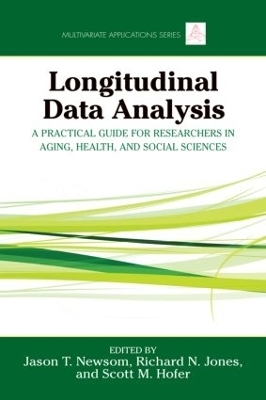
Longitudinal Data Analysis
Routledge (Verlag)
978-0-415-87415-1 (ISBN)
Although many of the examples address health or social science questions related to aging, readers from other disciplines will find the analyses relevant to their work. In addition to demonstrating statistical analysis of longitudinal data, the book shows how to interpret and analyze the results within the context of the research design. The methods covered in this book are applicable to a range of applied problems including short- to long-term longitudinal studies using a range of sample sizes.
The book provides non-technical, practical introductions to the concepts and issues relevant to longitudinal analysis. Topics include use of publicly available data sets, weighting and adjusting for complex sampling designs with longitudinal studies, missing data and attrition, measurement issues related to longitudinal research, the use of ANOVA and regression for average change over time, mediation analysis, growth curve models, basic and advanced structural equation models, and survival analysis.
An ideal supplement for graduate level courses on data analysis and/or longitudinal modeling taught in psychology, gerontology, public health, human development, family studies, medicine, sociology, social work, and other behavioral, social, and health sciences, this multidisciplinary book will also appeal to researchers in these fields.
Jason T. Newsom is an Associate Professor in the Institute on Aging at Portland State University. He received his Ph.D. in Social Psychology from Arizona State University in 1993. Dr. Newsom teaches data analysis, advanced data analysis, and research methods. His research focuses on care among physically impaired older adults, social interaction and support among older adults, health behaviors among older adults, and longitudinal research design and analysis. Richard N. Jones, Sc.D., is an epidemiologist who studies issues regarding mental health and aging. His research focuses on social and environmental correlates and possible modifiers of cognitive aging, and the epidemiology of depression among older adults. He leads several Data Management and Statistical Analysis cores for research based at the Institute for Aging Research at the Hebrew Rehabilitation Center, a Harvard Medical School affiliated long term care hospital in Boston, MA. Scott M. Hofer is a Professor of Psychology and the Harold Mohr, M.D. and Wilhelma Mohr, M.D. Research Chair in Adult Development and Aging at the University of Victoria, Canada. He received his Ph.D. in Psychology, Adult Development and Aging, from the University of Southern California in 1994. His research focuses on the identification and explanation of individual differences in developmental and aging-related processes and involves analysis of existing longitudinal studies, new data collection efforts using intensive measurement designs, and developments in research methodology focused on measurement and analysis of change. He co-directs the Integrative Analysis of Longitudinal Studies on Aging (IALSA) research network for the coordinated analysis and synthesis of longitudinal research on aging-related change in cognition, health, and personality.
N. Huguet, S. D. Cunningham, J. T. Newsom, Existing Longitudinal Data Sets for the Study of Health and Social Aspects of Aging. S. D. Cunningham, N. Huguet, Weighting and Complex Sampling Design Adjustments in Longitudinal Studies. D. Feng, Z. Cong, M. Silverstein, Missing Data and Attrition. D. E. Bontempo, F. M.E. Grouzet, S. M. Hofer, Measurement Issues in the Analysis of Within-Person Change. J. T. Newsom, Basic Longitudinal Analysis Approaches for Continuous and Categorical Variables. D. L. Roth, D. P. MacKinnon, Mediation Analysis with Longitudinal Data. B. A. Shaw, J. Liang, Growth Models with Multilevel Regression. M. J. Rovine, S. Liu, Structural Equation Modeling Approaches to Longitudinal Data. R. N. Jones, Latent Growth Curve Models. A. Jajodia, Dynamic Structural Equation Models of Change. S. E. Graham, J. B. Willett, J. D. Singer, Using Discrete-Time Survival Analysis to Study Event Occurrence.
| Reihe/Serie | Multivariate Applications Series |
|---|---|
| Verlagsort | London |
| Sprache | englisch |
| Maße | 152 x 229 mm |
| Gewicht | 657 g |
| Themenwelt | Geisteswissenschaften ► Psychologie ► Allgemeine Psychologie |
| Mathematik / Informatik ► Mathematik | |
| Studium ► Querschnittsbereiche ► Epidemiologie / Med. Biometrie | |
| Sozialwissenschaften ► Soziologie | |
| ISBN-10 | 0-415-87415-7 / 0415874157 |
| ISBN-13 | 978-0-415-87415-1 / 9780415874151 |
| Zustand | Neuware |
| Informationen gemäß Produktsicherheitsverordnung (GPSR) | |
| Haben Sie eine Frage zum Produkt? |
aus dem Bereich


